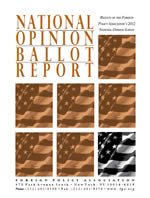Support for Democracy Promotion in National Opinion Ballot

Americans participating in the Great Decisions annual National Opinion Ballot express strong support for democracy promotion.
by Kirsten Stevenson
 The United States has long viewed itself as a beacon of democracy, or, as Ronald Reagan once said, a "shining city upon a hill whose beacon light guides freedom-loving people everywhere." Since the end of the Cold War, the success of American efforts to promote democracy has varied, as have American views on whether or not democracy promotion should be a top priority for those who shape U.S. foreign policy.
The United States has long viewed itself as a beacon of democracy, or, as Ronald Reagan once said, a "shining city upon a hill whose beacon light guides freedom-loving people everywhere." Since the end of the Cold War, the success of American efforts to promote democracy has varied, as have American views on whether or not democracy promotion should be a top priority for those who shape U.S. foreign policy.
The Foreign Policy Association’s National Opinion Ballot Report participants think it should be, with a few caveats. Overall, the prevailing conclusion drawn by the Foreign Policy Association’s balloters is that the U.S. should continue to actively promote democracy internationally, with 72 percent in agreement. When undertaken unilaterally by the U.S., 51 percent of balloters determined the best approach to democracy assistance is in the form of funding, training, and organizing. Diplomacy was a close second, whereas sanctions and military force fell far behind. However, 70 percent of balloters would like increased governmental transparency and accountability to the public in regards to the disbursement of democracy assistance.
Additionally, 74 percent of those polled were in favor of a transition to an increasingly multilateral approach, in which organizations such as the UN or NATO are the primary actors, with the U.S. playing a strong supporting role.
All this is indicative of a shift towards a pragmatic, internationally driven, and less invasive approach to democracy promotion. The U.S. is facing a number of challenges both economic and political at home, and although balloters do not wish to abandon democratization efforts, they indicate that the way we go about promoting democracy worldwide should adhere to these new realities.
READ THE 2012 NATION OPINION BALLOT REPORT





